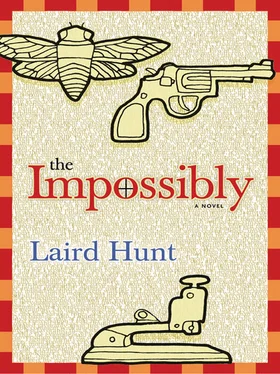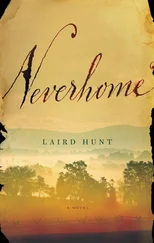Happier is not the word. Happier is definitely not the word.
Along those lines, before I completely leave daylight behind, it would be just as well, I think, to clarify that the city, setting metaphor aside, is really almost anything but white. This is not to say that many of the buildings are not white — many are or are clearly meant to be. It is just that, upon more careful inspection, carried out on that day of diurnal exploration, from the precinct of a large hill at the southern end of the city, I discovered that the city has more that is gray or tan about it than anything, and if one counts the endless and variegate colors of the awnings drawn over the terraces and rooftops and balconies (green and blue and yellow could be said to predominate), and the above-mentioned orange roofs, all seen through a considerable haze of pollution, then the city ceases, far from being, even to seem white. Years ago, in the company of friends, I visited another city by the sea, and I have made several attempts these last days to remember what color it was. I do remember, of course, walking arm in arm, and I remember the slightly waving fronds on the trees and the generally sloping aspect of the streets and the gentle curve of the hills. I remember, too, setting the events of my first disaffirmation in motion, the disaffirmation that was justified and of which, however perversely, I maintain a certain measure of pride. The second disaffirmation, the one that didn’t hold, the one during which I lost so much weight, I find I cannot feel proud of, although I have no doubt she deserved it. Why this? I asked her. Why this, after everything you’ve put me through? Why now? She made an attempt to answer, couldn’t get past the stutter, gave up, and lifted her gun. But I was faster.
I thought about that, of course, as I sat beneath the handsome floor lamp or lay sleepless in the large bed. I thought about it as I walked the well-lit streets after dark or sat, in company as it were, among the old men on the benches in the gardens, and sometimes as I thought about it my hand, which often itched anyway, itched to be holding a gun. And yet all of that was over, long over. It’s best to make some effort to let these things go, I said to an old man sitting beside me on a bench. Hah! he said. Which pleased me greatly, but seemed also to preclude any sort of elaboration. And in fact when he continued it was in a completely different vein, so that after several minutes of regarding his unhealthy gums, I moved on. It occurred to me, following this interaction, to climb the narrow streets and consider the old women a little as they sat in their doorways or stood talking in small groups. Some of these conversations, I discovered, were quite interesting. One old woman, for example, was describing her recent efforts to have the asbestos removed from her son’s place of work, efforts, she said, that were being hampered both by her son and her son’s boss. At this, one of the old women, who stood almost completely wrapped in shadow, suggested that if removal of the asbestos was the first old woman’s primary concern, and her son and her son’s boss were interfering, then she might simply dispose of them. There was a silence. I leaned a little closer. Yes, I’d thought of that, the first old woman said. They began to discuss methods. One of them suggested cocktails and powdered glass. Another, arson — if you did it right it could look, she said, like spontaneous combustion. After this, the conversation grew unfocused and I walked off. Just as I’d entered a nearby path bordered by a double line of flowering bushes and had begun to think about the endlessly shifting arabesques and the variety of browns and greens of the small dark leaves and stems, which would certainly be more clearly determined in the daylight, someone came up beside me and took my arm. It’s a lovely night, I said. Yes, she said. I recognized the voice — it belonged to the woman who had intervened in the conversation a moment before. Should I be alarmed? I asked her. She laughed. She had a very pretty laugh, perhaps a little loud, but clear and rich in the warm evening air. I started to turn my head to look at her, but she told me to keep looking straight ahead. By now we were walking along a slightly wider path. Above us, beautifully illuminated, was the enormous eminence at the top of which stood, or in some cases barely stood, the ruins of temples or who knows what. You should take a tour, she said. I don’t get out during the daytime lately, I said. An evening tour could be arranged. That’s a thought. I’ve taken such a tour myself — the moon and starlight do wonders with polished stone. Why are you walking with me? My house is just over there. So? So that’s where we’re going. Is this it then? Is what it? Because I thought I had an agreement. What are you talking about? I started to look at her. She lifted her hand and placed it, firmly, against the side of my face. We walked a little farther. So this doesn’t have anything to do with anything? I said. I didn’t say that. What did you say? I didn’t say anything, she said, squeezing my arm. I started, I thought, to get the picture. Well then, yes, I’d like to take a tour, I said. I’ll arrange it. She did. A couple of nights later. No one was there but the gates were open and for several hours I wandered amidst the ruined structures. In the meantime, though, we entered a small house and then a small bedroom. I will just ask you to let me place this blindfold over your eyes. I think I’m too old for this. For what? Aren’t you going to tie me up? I hadn’t thought of it, do you want me to tie you up? Well, no, I guess not. Because if you want me to I will. No, that’s okay. She put the blindfold over my eyes. You look much better than you used to, she said. What do you mean? Just that. Who are you? Never mind. Well anyway, I don’t look better, I look terrible, I couldn’t look worse. Yes you could. I was about to reply to this, when she kissed me lightly and, none too gently, shoved me onto the bed.
I am not very much bothered by the dark, as such, and in fact, under normal circumstances, I am really quite comfortable in it. I have passed many pleasant moments in the dark during my life and, if stray lines of light are capable of stimulating certain memories, so are dark closets and dark eyes and bands of curved, dark shadow and couches set in the center of completely dark rooms. So it was that, far from being disturbed by the fact that the lock turned behind her when she left, and that the room was pitch black so that it made no significant difference whether or not I continued to wear the blindfold (after attempting to check my surroundings I did), I felt quite comfortable and after a time lay down on the bed with my legs slightly spread and my hands behind my head and thought of nights gone by and the latter part of my career and my undeniable skill at certain aspects of it and my undeniable weakness at others. Before long I fell asleep. Once or twice as I lay in the dark room, I woke and, instinctively, listened for other breathing, but heard none. Then I did. Or so it seemed. A small tremor shook my skin and for half a second the hair on the backs of my hands lifted slightly. But then, after applying considerable directed attention, and with a sense of mild embarrassment, I realized that I had been listening to myself breathing, a sound no doubt much distorted by memories and dreams. Neither of which, at that moment, could be called pleasant. The breathing — I continued to listen to it — could similarly not be called pleasant and in fact seemed somehow awful, like something to be dealt harshly with, and I wished I had a gun. A few moments later, however, my breathing had come to seem normal to me again and even, strangely, to seem quite sweet or pretty, or at any rate, kind of nice and certainly useful, and I found myself turning to thoughts of the not altogether unenjoyable interaction I had had with the woman and to otherwise diverting myself in the gloom.
Читать дальше










![Беар Гриллс - The Hunt [=The Devil's Sanctuary]](/books/428447/bear-grills-the-hunt-the-devil-s-sanctuary-thumb.webp)

